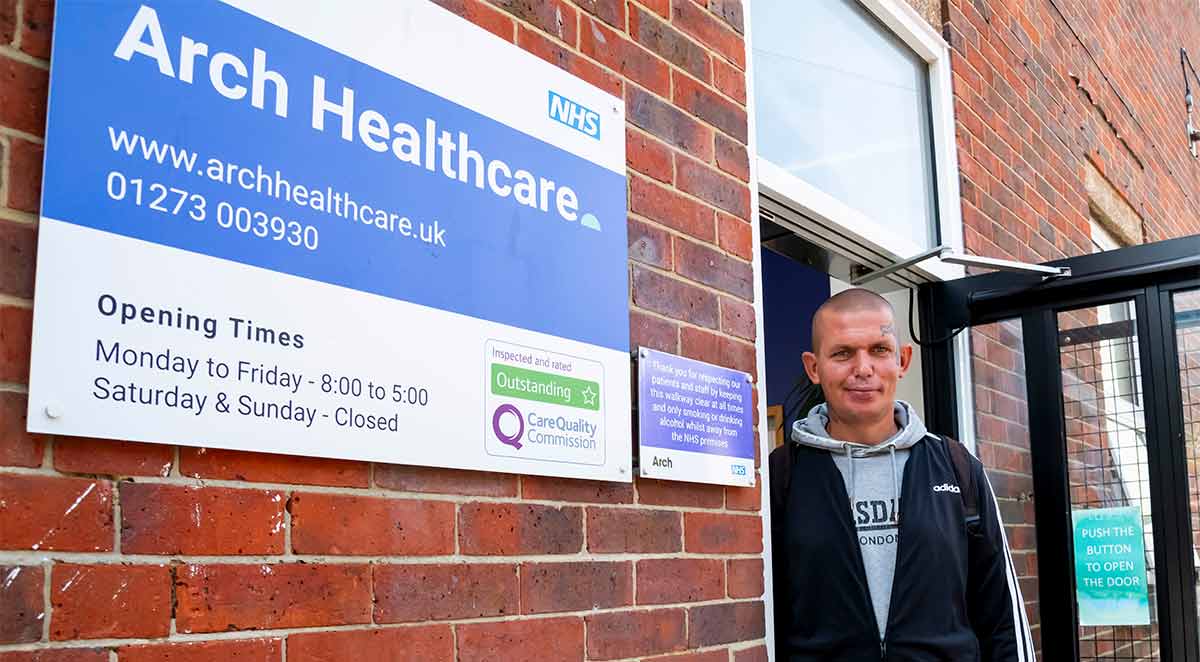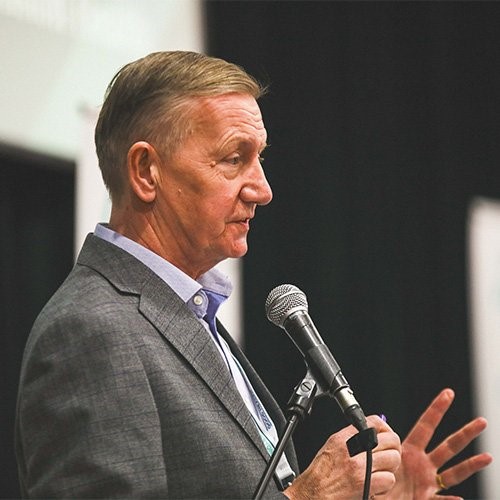
Last year over 4,000 people were discharged from hospital with nowhere to go but the streets, the true number is higher and possible double that.

Dr Chris Sargeant is a GP and medical director at Pathway, a charity set up following a tragic incident where a patient experiencing homelessness at UCLH was discharged back onto the streets and died a short time later.
Chris works in one of the Pathway teams in the main Brighton hospital, the Royal Sussex County – which see 450 people who are homeless admitted every year.
Pathway teams support patients who are homeless during their admission, work with them and hospital staff to agree appropriate treatment options and help to ensure a patient can stay in hospital to complete their treatment (20% of those experiencing homelessness discharge themselves from hospital compared to 3% of the general population).
“People experiencing street homelessness are often isolated and cut off from their families,” Chris explains, “so we ensure that they get the visits and support they need, we bring them essentials like clothes, shoes, phones, and toiletries to make their stay comfortable.”
The team also plans for a safe discharge. This can mean getting the patient registered at a GP practice, liaising with community and social services, and arranging appropriate alcohol, substance use and wider mental health support. They also liaise with local housing services to ensure their clients have somewhere safe to go.
“We know it works,” says Chris, “it stops the revolving door we see where patients go from the hospital to the street, and back into hospital.” In a randomised clinical trial this approach showed better health outcomes and dramatically reduced discharge to the street.

Originally from Yorkshire, Chris qualified in medicine at the Royal Free Hospital in 1989 and then completed GP training in North London. In 1998 he moved to Brighton as a recently qualified GP and took a role at a new practice specifically for people experiencing homelessness, now called ARCH (Accessible, Restorative, Community Healthcare).
From here, he became part of the Pathway team at the hospital and he went on to become the charity’s Medical Director and Secretary to the Faculty for Homeless and Inclusion Health.
Homeless people have unique and complex health needs. Chris explains that ‘the common chronic illnesses [including stomach and liver issues, IHD, cancer, diabetes and COPD] are much more common and advanced. There are also additional problems in managing long term conditions and access to treatment’. He says many of his patients have ‘tri-morbidity’, the combination of chronic physical health issues, long term mental health issues, and dependencies on alcohol or drugs. He also finds this group experience premature aging and frailty.
"The typical GP practice model doesn’t always serve this group well,” Chris explains, “it’s difficult to register if you don’t have a fixed address, to keep to appointments and run a schedule if you’re experiencing mental health or dependence issues. We offer another model.”
ARCH has an approach that is different to many practices. For example, half of all appointments are walk-ins and the surgery has an outreach service led by an Advanced Nurse Practitioner. There is also leniency towards some behaviours such as patients using strong language. “Obviously abuse isn’t tolerated,” Chris clarifies, “but we allow people to communicate in their normal way...it removes a barrier and helps to build trust.”
Chris is cognizant that offering such a flexible approach may be challenging for practices that have other patient groups to consider, as well as bringing the need for additional training for staff, but he’s clear that access to primary care services for people experiencing homelessness is key to ensuring better health outcomes.
He explains that many of the patients he encounters through Pathway wouldn’t have had to go hospital if they could have accessed primary care at the right time, and that lack of access means ‘vital prevention opportunities, such as vaccinations and BBV and cancer screenings, can be missed.’
“No one can expect GPs to solve the problem of street homelessness,” he says, “but if people are not able to register, then nothing else can follow.” He’d like practices to consider whether their registration processes are a barrier to homeless people accessing their services - do they request ID and proof of address, for example – and if so, whether there is another approach they could take.
“It’s very easy to become homeless but very hard to get out of homelessness. People may not know how to access support from their local authority before they reach crisis point, and there’s a severe shortage of suitable housing. If people have moved around, they may be told that they are not in the right area to get help, and so become stuck,” Chris says.
If GPs want to find out more about supporting people experiencing homelessness in their area, Chris suggests joining the Faculty for Homeless and Inclusion Health for information, networks, conferences and relevant job opportunities. He also recommends reaching out to local day centres to let them know their practice is welcoming of patients who are experiencing homelessness.
More widely Chris wants to see the government ensure the correct level of provision for people experiencing homelessness in every hospital, in line with the NICE 214 guideline. He says, ‘even when we have a team in a hospital, it’s difficult to keep them funded, as so often this group of people just aren’t seen as a priority for help, but doing nothing is more expensive, and worse for everyone-patients, services and commissioners.’
Thank you for your feedback. Your response will help improve this page.
